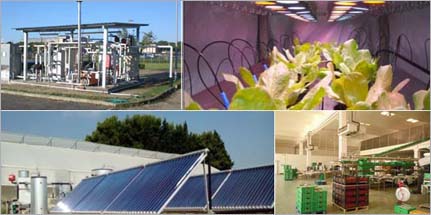Agricolture: 21% decrease in energy consumption but up to 70% savings with energy efficiency
7/7/2016
Energy consumption in the Italian agri-food sector decreased both as absolute value (-21%, from 16.79 to 13.3 Mtep) and as a share of the final energy consumption in Italy between 2013 and 2014 (from 13% to 11.1%) but there’s scope for an additional decrease with green measures and technologies.
 In the food sector for instance, whose energy consumption is double that of the agricultural sector (8.57 against 4.73 Mtep). This is the picture ENEA presented at the Conference “Energy Efficiency for the Competitiveness of Farms, Agri-food and Forestry” organized by the Agency with the participation of GSE, CREA, Coldiretti, FIRE and Assoesco, among others.
In the food sector for instance, whose energy consumption is double that of the agricultural sector (8.57 against 4.73 Mtep). This is the picture ENEA presented at the Conference “Energy Efficiency for the Competitiveness of Farms, Agri-food and Forestry” organized by the Agency with the participation of GSE, CREA, Coldiretti, FIRE and Assoesco, among others.
ENEA estimates 25% energy savings in irrigation, 70% savings in ventilation of industrial premises and 20% savings in agri-food production and processing with energy efficiency measures and green technologies both in the production, processing and storage of products, including phytosanitary products and fertilizers and conditioning of workplaces. These are solutions with a 5-7 year investment return based mainly on solar cooling plants, high-efficiency LEDs and softwares for the self diagnosis of energy efficiency.
Solar cooling plants harness solar radiation to produce refrigerated water for summer conditioning of greenhouse systems. A demonstrative plant with a cooling power of 113 GJ/year was set up in Valenzano (Bari) under the project Adriacold, developed by ENEA jointly with the Bari University.
ENEA has also developed sustainable greenhouse systems - greenhouse building - powered with photovoltaics and LED lighting systems (greenhouse cultivations are the most energy-intensive sector in the supply chain, with a food energy ratio = output/input of 0.04 against 1.23 of open - field cultivations) based on soilless cultivation technologies, with a view to increased productivity (tenfold the conventional systems) and saving of resources.
In order to increase thermal insulation, reduce emissions and conditioning consumptions, ENEA has developed green roof and green wall models, thanks to innovative technological solutions that turn to nature to improve the energy efficiency of buildings.
At operational level, ENEA has developed a guide to the energy diagnosis for the enterprises of the sector, on the basis of 110 energy audits of European companies, in addition to training and dissemination activities, handbooks on best practices and the development of an ad hoc software for self-diagnosis under the project TESLA (Transfering Energy Save Laid on Agroindustry) to reduce the energy costs of the european agrifood cooperatives, in collaboration with Legacoop, Confagri and other research centers.
An additional project aimed at the reduction of the energy consumption of agro-industries is SCOoPE (Saving COOperative Energy), envisaging the involvement of 81 target enterprises and the creation of six industrial clusters to promote, among other things, shared acquisitions and the adoption of shared procedures for the collection and monitoring of data to improve energy efficiency and cut energy consumption.
“It’s necessary to implement new production and industrial strategies to be integrated within the agri-food system that, alongside technology optimization, ensure that the natural resources of water, energy, soil and the atmosphere are respected- Tullio Fanelli, ENEA Deputy Director General, pointed out- In this context ENEA plays a key role for local administrations for elaborating new energy and development paradigms and synergies with the institutions”
“With this workshop, organized in our role as Agency for Energy Efficiency, we intend to foster the largest collaboration among institutions, the world of research and enterprises, to highlight the potentials of energy efficiency as a lever for competitiveness, employement and innovation in a perspective of sustainable economic development” Carlo Alberto Campiotti of the ENEA Energy Efficiency Unit, said”.
But that’s not all. In Italy 3% of the energy consumption comes from food waste, a percentage equivalent to the energy consumption of over a million and a half inhabitants. In this contesxt ENEA has been committed to the diffusion of good practices both for food waste reduction and the use of food waste in biogas production.
Also organic farming can help consume less energy and reduce CO2 emissions in the atmosphere. “Organic farming cuts energy consumptions in the agricultural sector and the food industry by at least 25% compared to conventional agriculture” Valentino Mercati, President of Aboca, industry leader in the organic sector, pointed out, and it’s important also because it’s able to store carbon in soil through vegetal waste and consume CO2 through photosynthesis. Furthermore, since it doesn’t use fertilizers and phytosanitary products, it ensures total biodegradability of the inputs employed and doesn’t pollute groundwater, enabling us to save also on treatment cost”, he concluded.
ENEA has recently signed an agreement with the Ministry of Agriculture and Forestry to promote energy efficiency and the use of renewables in the agricultural, forestry and agro-industry sector, optimizing consumptions and improving savings, particularly of energy - intensive activities. The protocol envisages a strengthened collaboration between ENEA and the MiPAAF to improve energy efficiency in the agri-food system, reduce environmental impacts and improve the transfer of know-how and innovative technologies, also through information and communication actvities on energy consumption at national and regional level, in accordance with Directive 27/EU/2014.
Also aimed at energy efficiency promotion is the Agreement with the Sicily Region. Thanks to ENEA it’s now possible to upgrade the energy sustainability and the environmental quality of the agro-industry, Francesco Ribaudo, member of the Commission for Finance and Regional Issues of the Chamber of Deputies, pointed out, it’s an opportunity not to be missed for supporting the development of enterprises and youth employement, particularly in Sicily, where agriculture is one the major economic assets.
For more information please contact:
Carlo Alberto Campiotti, ENEA Casaccia Research Center, carloalberto.campiotti@enea.it
